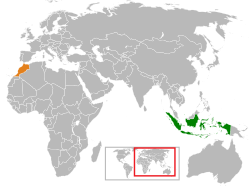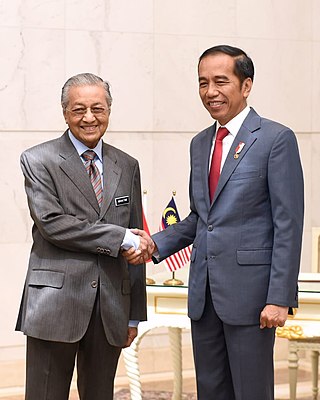
Since independence, Indonesian foreign relations have adhered to a "free and active" foreign policy, seeking to play a role in regional affairs commensurate with its size and location but avoiding involvement in conflicts among major powers. During the Presidency of Sukarno, Indonesia's Foreign Relations were marked by engagement with other newly independent nations in Asia and Africa, as exemplified by the Bandung Conference, the subsequent foundation of the Non-Aligned Movement and a confrontational attitude towards Western powers, justified by a belief in the CONEFO and opposition to what Sukarno termed as NEKOLIM.
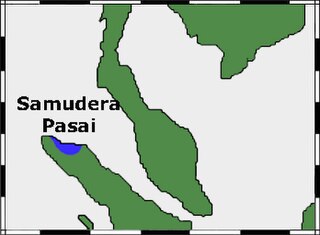
The Samudera Pasai Sultanate, also known as Samudera or Pasai or Samudera Darussalam or Pacem, was a Muslim kingdom on the north coast of Sumatra from the 13th to the 16th centuries. The kingdom was believed to have been founded by Merah Silu, who later converted to Islam and adopted the name Malik ul Salih, in the year 1267 CE.

China and Indonesia established formal diplomatic relations in 1950, more commonly referred to as Sino-Indonesian relations. Prior to this, for many centuries, the two countries maintained a variety of relations mainly in informal trade. Under Sukarno’s presidency, from 1945 to 1967, relations with China deepened, as in the early 1960s Sukarno embarked on a series of aggressive foreign policies under the rubric of anti-imperialism and personally championed the Non-Aligned Movement. These developments led to increasing friction with the West and closer relations both with China and the USSR.

Argentina and Indonesia established diplomatic relations in 1956. Since then, bilateral relations between both countries have become increasingly more strategic. According to Argentine Ambassador to Indonesian Javier A. Sanz de Urquiza, Indonesia has been a "true friend of Argentina" over the Falkland Islands sovereignty dispute. Argentina has an embassy in Jakarta, while Indonesia has an embassy in Buenos Aires. Both countries say they share the same values regarding the international order, and the same aspiration to defend the developing nations' interest in international forum. Both countries are members of Group of 77, the G-20 major economies, the G20 developing nations, and Forum of East Asia-Latin America Cooperation.

India–Morocco relations are the bilateral ties between Morocco and India. Morocco has an embassy in New Delhi, and Consulates in Mumbai and Kolkata. India operates an embassy in Rabat. Both nations are part of the Non-Aligned Movement.

Indonesia and Vietnam established diplomatic relations in 1955. Indonesia has an embassy in Hanoi. Vietnam has an embassy in Jakarta. Both are neighboring nations that have a maritime border which lies on the South China Sea and are members of ASEAN and APEC.
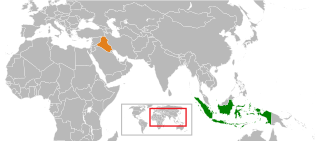
Indonesia and Iraq established diplomatic relations in 1950. Diplomatic relations are important since they share similarity as Muslim majority countries. Indonesia is the most populous Muslim country in the world, while Iraq also a Muslim majority nation. Diplomatic relations were established in 1950. Indonesia has an embassy in Baghdad, while Iraq has an embassy in Jakarta. Both nations are members of the Non-Aligned Movement and Organisation of Islamic Cooperation (OIC).
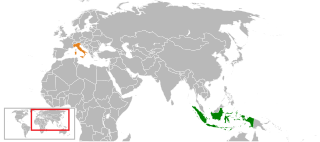
Indonesia and Italy established diplomatic relations in the early 1950s. Italy has shown strong desire to improve its relations with Indonesia, especially in intercultural understanding and trade. Indonesia recognizes Italy's strategic location and important role in the middle of Mediterranean region, while Italy has favoured relations with Indonesia, and sees Indonesia as the leader in Southeast Asia. The relations between two countries not only important to bridge the two regional communities; European Union and ASEAN, but also vital as intercultural and interfaith dialog, since Indonesia has the largest Muslim population in the world, and Italy is the heart of the Catholic faith.

Cuba and Indonesia established diplomatic relations in 1960. During the administration of Indonesia's first president Sukarno in the 1960s, Indonesia and Cuba enjoyed an exceptionally close relationship. The relations between the two nations mostly focused on sports and health. Cuba has an embassy in Jakarta, while Indonesia has an embassy in Havana that is also accredited to the Commonwealth of the Bahamas and Jamaica. Both nations are full members of the Non-Aligned Movement and partners in the Group of 77 and the Forum of East Asia-Latin America Cooperation.

Indonesia and Venezuela established diplomatic relations in 1959. Since then, both countries enjoy friendly ties. Both nations agreed to expand the trade and investment relations, especially in tourism, technology, chemicals and natural gas sectors. Indonesia has an embassy in Caracas, while Venezuela has an embassy in Jakarta. Indonesia and Venezuela are members of multilateral organizations such as the World Trade Organization (WTO), Non-Aligned Movement and Forum of East Asia-Latin America Cooperation.

Indonesia and Sweden established diplomatic relations in 1950. In recent years both nations demonstrate growing keenness to improve bilateral relations, as each head of government exchanged visits. Indonesia has an embassy in Stockholm that also accredited to Latvia, while Sweden has an embassy in Jakarta that also accredited to East Timor.

Indonesia and Saudi Arabia established diplomatic relations in 1950. Relations are particularly important because Saudi Arabia is the birthplace of Islam, and Indonesia is home to the world's largest Muslim population; both are Muslim majority countries. Economy and trade relations are also particularly important, especially on oil (energy) and human resources sectors. Saudi Arabia has an embassy in Jakarta, while Indonesia has an embassy in Riyadh and a consulate in Jeddah. Both countries are members of the Organisation of Islamic Cooperation and G-20 major economies.

Indonesia and Peru established diplomatic relations in 1975. Both nations see each other as an attractive market with good prospects and potentials, and seeks to boost trade relations. Indonesia has an embassy in Lima, while Peru has an embassy in Jakarta. Indonesia and Peru are members of multilateral organizations such as the Asia-Pacific Economic Cooperation, the World Trade Organization (WTO), Non-Aligned Movement and Forum of East Asia-Latin America Cooperation.

Indonesia–Uzbekistan relations was officially established on June 23, 1992. Both countries have recognized importance of each other's potential; Uzbekistan realized the strategic importance of Indonesia, home to the world's biggest Muslim population and Southeast Asia’s biggest economy, while Indonesia recognize Uzbekistan strategic importance as the gate to Central Asia, a growing economy also a potential market. Indonesia has an embassy in Tashkent, while Uzbekistan has an embassy in Jakarta. Both countries have Muslim-majority population and both are members of Organisation of Islamic Cooperation.

Indonesia–Sudan relations was officially established in 1960. In February 2012, during a visit of Sudanese Foreign Minister Ali Karti to Jakarta, Indonesia and Sudan has agreed to foster bilateral relations in politics, science, education and economic sectors. Indonesia has an embassy in Khartoum, while Sudan has an embassy in Jakarta. Both countries have Muslim-majority population and both are members of Organisation of Islamic Cooperation.

Indonesia–Syria relations was officially established in 1949, and it was among earliest international recognitions on Indonesian sovereignty. Both nations have common perceptions related to Palestine, Iraq and Lebanon issues, and Indonesia always supports Syria in international forum on the issue of the Golan Heights. Regarding the current events of the Syrian Civil War, Indonesia has urged all parties in Syria to end the violence, while pledging to provide US$500,000 worth of humanitarian assistance to conflict-torn Syria in 2014. Previously Indonesia has donated the same amount to Syria in 2012 and 2013 under United Nations. Indonesia has an embassy in Damascus, while Syria has an embassy in Jakarta. Both nations are the member of Non-Aligned Movement and Organisation of Islamic Cooperation.

Foreign relations were officially established in 1992. Azerbaijan appreciates Indonesia's support in international forums on Azerbaijan position regarding the Nagorno-Karabakh conflict. Azerbaijan has an embassy in Jakarta while Indonesia has an embassy in Baku. Both nations are the member of Organization of Islamic Cooperation and Non Aligned Movement.

Indonesia–Qatar relations were officially established in 1976. Both countries are Muslim-majority ones, with Indonesia being the largest. Both nations are members of Organization of Islamic Cooperation.

Diplomatic relations between Australia and Morocco were established in 1976. Morocco has had an embassy in Canberra since 2004 and the Australian Embassy in Rabat was established in May 2017, upgrading the existing Austrade office in Rabat. Previously the Australian Embassy in Paris was accredited to Morocco since 1978.

Bangladesh–Morocco relations refer to the bilateral relations between Bangladesh and Morocco. Bangladesh has an embassy in Rabat. Morocco has an embassy in Dhaka. Both countries are members of the Organisation of Islamic Cooperation, Group of 77, Non-Aligned Movement and United Nations.
